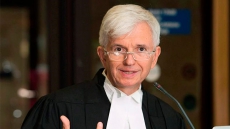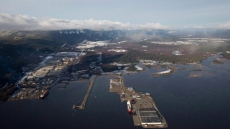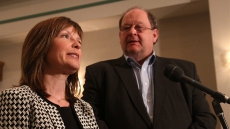OTTAWA — Almost 7,000 outstanding pardon applications are in limbo as the Parole Board of Canada struggles to clear a backlog created when the Conservative government changed the rules in 2010.
The parole board has announced it is not currently processing old pardon applications for more serious, indictable offences, but rather is focusing its efforts on lesser, summary convictions.
In March 2013, the board told The Canadian Press it would clear a backlog of 22,000 older applications within two years, but now says it still has more than 10,000 applications remaining.
It announced last month that only older applications pertaining to summary offences are being processed at this time.
"The board expects to have close to 70 per cent of the overall backlog, and 100 per cent of the backlog of files containing offences tried summarily, cleared by March 31, 2015," the board said in response to a media inquiry.
"This will leave approximately 6,963 applications for indictable offences in the backlog."
Asked how and when those applications would be handled, the board replied it "does not currently have a timeline for when the backlog will be cleared."
A notice on the board's website suggests applicants — long ago having submitted the proper paperwork and the appropriate fee — start over with a new application that now costs $631.
The parole board's mission statement is "the timely reintegration of offenders as law-abiding citizens."
For thousands of Canadians who have long-since served their sentences and returned to a crime-free life, advocates say the backlog means their criminal records are easily obtained, shutting the door to job, education and housing opportunities.
"It is unacceptable that people are being denied human rights protections associated with pardons due to administrative delay and poverty," Catherine Latimer, the executive director of the John Howard Society, said in a release.
The backlog resulted from a government crackdown on the whole pardons process after The Canadian Press revealed in 2010 that former hockey coach and serial sex predator Graham James had been granted a routine pardon.
James was facing fresh allegations at the time, to which he has since pleaded guilty. The public outcry over his pardon prompted a sharp political reaction.
The Parole Board was immediately given a new mandate to ensure no pardon would be granted that could bring the administration of justice into disrepute.
The Conservative government later enacted a three-strikes rule, meaning anyone with more than three convictions for indictable offences with two-year sentences (even if all served concurrently) could never be pardoned. Certain offences, such as sex crimes against children, were made ineligible.
The crime-free cooling off period after a sentence was fully served was also increased to five years from three for lesser offences, and doubled to 10 years from five for indictable offences.
The term "pardon" was dropped and the process is now referred to as a "record suspension."
And the application fee, long set at an affordable $50 to reflect the notion that pardons benefit society as much as the individual, was tripled to $150 and subsequently raised to the current $631.





